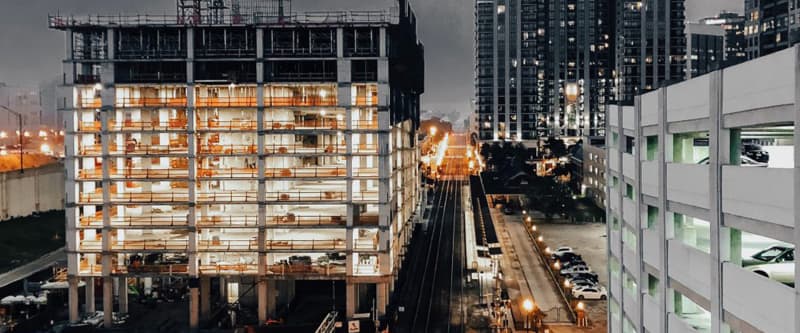Having a reliable high-speed internet connection on site throughout a construction project has become standard practice. Let’s take a closer look at why and what benefits wireless access brings to the industry.
How can construction Wi-Fi help you?
Like every type of business, construction firms are increasingly digital operations, which rely on connectivity for day-to-day coordination and communication.
But unlike an office-based outfit, a construction firm cannot rely on existing IT and network infrastructure when it arrives at a new site, and that creates a dilemma as creating a new internet link to a site with a wired leased line connection requires trenches to be dug and cable to be laid. This adds expense to the job and takes time. If you are on a site that grows in size over time, such as a major housing development, you have to keep digging new channels and laying new lines to extend access.
For modern construction firms that pride themselves on efficiency and agility, waiting for wired lines for their internet service to be installed before they can progress with a job no longer seems acceptable.
The difference between ‘wireless’ and ‘Wi-Fi’ for construction sites
It is important to distinguish wireless from Wi-Fi.
Even though Wi-Fi routers provide wireless access to an internet service, meaning workers on-site can use their smartphones, laptops, tablets and other devices as they move around, it is normal for those routers themselves to be connected to wired lines which deliver the broadband service on-site.
But with wireless leased lines, that service is delivered using radio and microwave technology – which is how you get 3G and 4G mobile data services to your smartphone.
We offer a range of wireless internet services, from wireless leased lines to 4G solutions.
Wi-Fi for construction sites: why is it needed?
Fast, reliable internet and Wi-Fi is increasingly becoming a must-have on building sites simply because construction firms and contractors are using more and more digital devices and applications that rely on a network connection. Examples include:
Cloud-based services
Construction companies have long used desktop and laptop computers for running CAD software to share and develop architectural and engineering designs on site.
In the past, these programmes would have been stored on individual machines, meaning workers and contractors would have to go to the site office or have a laptop taken to them to view the plans.
With cloud-based CAD software services, there is the benefit of being able to access the platform on any device. This creates much more flexibility, meaning new designs and instructions can be shared quickly to everyone who needs to see them, and contractors can refer back to them as they work on their own device.
The point is, of course, that cloud services rely on internet access.
On-site communications
Smartphones have revolutionised how mobile teams like construction workers stay in touch with clients, development partners and colleagues back in head office.
They allow individuals to make and take calls, answer emails, share files and pictures, have conversations on instant messaging (IM) platforms, all as they work. However, being able to do all of this via a Wi-Fi connection is much more cost-effective than using mobile data.
Similarly, Voice-over-Wi-Fi telephone services carry no charge at all, so for the cost of a single internet connection, an entire workforce can make unlimited calls for free.
Whether you’re looking for a private line or specialist connectivity solution, see what MConnect can offer your business.
Security
Rather than having security personnel on-site around the clock watching video feeds from security cameras, IP CCTV streams images via the internet either to the security team based in head office or to a contractor. This vastly reduces the cost of monitoring.
Other security features that rely on an internet connection include Wi-Fi operated access systems, which can stream an image from a camera at the gate to any smartphone and be unlocked remotely as required, again saving anyone having to man the gate all day.
IoT equipment
Smart machinery is growing in popularity in construction sites, with networked equipment enabling advanced data capture and monitoring to help drive performance and efficiency gains, and in some cases enabling automation of routine tasks.
An emerging field in this area is Building Information Modelling (BIM), which uses data from on-site sensors and cameras to create evolving 3D digital models of the site and the construction as it develops. These can be mapped directly against Computer Aided Designs (CADs) designs, or analysed for structural and functional integrity before anything progresses further.
As the name ‘Internet of Things’ suggests, all such systems rely on reliable connections.
Overall, high-speed quality broadband and Wi-Fi helps to boost on-site productivity by improving communications and information sharing, streamlining processes and driving efficiency gains and cost reductions through data analysis.
Smooth operations are supported by fast, reliable Wi-Fi on construction sites. Low, unreliable connections make workers wait around to download designs they need or don’t allow them to access the service they need, defeating much of the purpose of having an internet service in the first place.
4 benefits of construction Wi-Fi
1. Fast installation
The main benefit to construction firms of using wireless leased internet lines over wired is the speed and ease of installation.
With no trenches to dig and cables to lay, broadband services can be up and running much faster, subject to landlord approval and any licensing requirements. Fast, simple installation also means lower costs.
2.Temporary and flexible
Wireless also offers a more temporary, flexible solution for construction site broadband. Laying down wired lines means installing a permanent piece of infrastructure.
Although some construction projects last years, being able to switch off the service as and when required and leave behind no physical trace is a more sustainable option. From a provider’s perspective, it also means that we are able to offer shorter contracts that can adapt flexibly to however long the project takes.|
Wireless means that connections can be moved or extended easily as the site changes, plus we can upgrade bandwidth without having to think about relaying any new cabling.
3. Bandwidth and performance
There are sometimes questions about whether a wireless broadband service is as reliable as connecting via ethernet or fibre cable.
Our wireless services deliver bandwidth speeds of between 10Mbps and 2Gbps, which means it easily matches the performance of gigabit fibre-to-the-premises (FTTP) services. It delivers super low latency, which means your critical cloud and communications services will work smoothly with no buffering or glitches.
Want to see what else our wireless services can bring?
4. Resilience
Wireless as a solution for construction site Wi-Fi offers better resilience than wired lines. Especially on a site where there is lots of digging and heavy machinery going back and forth, wires always carry the risk of being accidentally cut or damaged – and if that happens, your whole internet service goes down. With wireless, this risk is completely avoided, meaning we are able to guarantee 99.95% network availability with a four-hour fix SLA if something does go wrong.
With all these benefits, it’s easy to see why Wi-Fi is becoming such a popular choice on construction sites!
Keep your business online, all the time with MConnect
To find out more about M247’s wireless leased line service, or contact one of our team to discuss your requirements.








